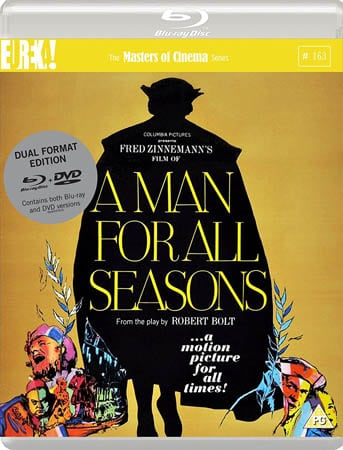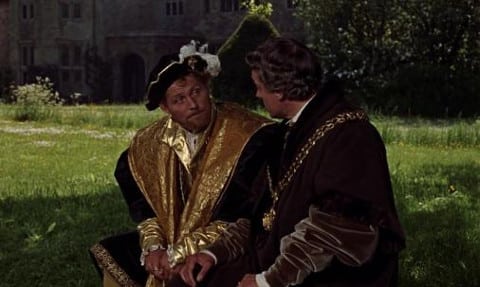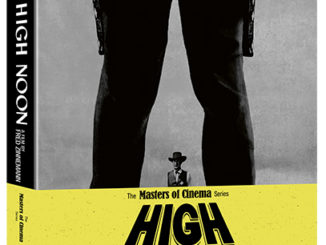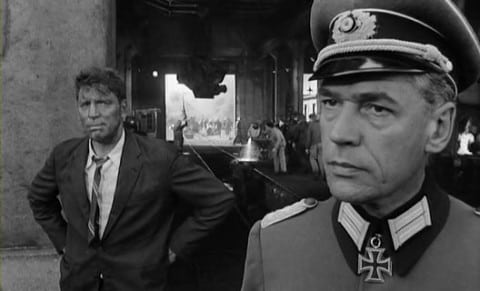A Man for All Seasons (1966)
Directed by: Fred Zinnemann
Written by: Robert Bolt
Starring: Leo McKern, Paul Scofield, Robert Shaw, Wendy Hiller
UK
ON DUAL FORMAT BLU-RAY AND DVD: 2oth February, from EUREKA ENTERTAINMENT
RUNNING TIME: 122 min
REVIEWED BY: Dr Lenera, Official HCF Critic
England 1659. Sir Thomas More, a lawyer promoted to Roman Catholic Chancellor, is forced into a difficult position when corrupt King Henry VIII demands his approval to divorce his wife Catherine and marry his mistress Anne Boleyn. Torn between his conscience and duty to the crown, Sir Thomas chooses to say nothing, sparking the rage of the king, and eventually resigns, but Henry will settle for nothing less than that the much respected More give public approval to his actions….
When you’re a reviewer of films for a website, quite often a screener comes through the letterbox and you put it in the Blu-ray player either there and then or on the first occasion where you know you have several hours to watch a film and review it. There are times though when a disc arrives and you wait and wait for what you think is “the right time” to see it – which basically means putting it off. A Man For All Seasons, a film I knew little of and only vaguely remembered learning about the historical background which inspired it, was such a film for me as I was pretty sure it would be extremely slow and talky [not that those are automatically bad things of course] and much like a stage play – and indeed it was extremely slow and talky but not at all, as it turned out, boring despite the lack of what is roughly referred to as ‘action’. As long as you’re in a patient mood, this is an utterly riveting, powerful and – in the end – extremely moving drama which if I was to sum up off the top of his bed I’d call a cross between Becket and The Crucible, though that description probably does it an injustice. I guess it’s difficult for many in our present secular society to truly understand just how central a role religion played in a person’s life during the period of the film; it was an age of faith when Christianity exerted the most powerful of influences on not just one’s actions but one’s thinking. But this film is also about more than that; it’s about sticking to one’s own conscience, no matter what, and I wouldn’t say that it’s a one-sided look at the issue either. And if that’s not enough for you, it’s Kevin Smith’s favourite movie.
The film is based on a play by Robert Bolt which begun life as a short radio production in 1954, and then became a one-hour live TV play version in 1957 by the BBC before Bolt turned it into a much lauded theatre production in 1960. Frank Finlay, Dirk Bogarde, and Bill Travers all turned down the role of Sir Thomas More, Charlton Heston lobbied extensively for it, and the producers wanted Laurence Olivier, but director Fred Zinnemann insisted on having Paul Scofield repeat his performance in the play, while Richard Harris and Peter O’ Toole both refused the part of Henry VIII, allowing Robert Shaw to step in. Vanessa Redgrave was originally lined up to play Margaret but she had theatre commitments and agreed to do an unpaid cameo as Anne Boleyn instead on the condition that it remain unbilled. The film was shot on a moderate budget over 12 weeks with the cast taking pay cuts. Orson Welles, who insisted on using an exact duplicate of Cardinal Wolsey’s official seal, as well as authentic sheepskin parchment and a quill pen, claimed that he directed his scenes himself, though Zinnemann never mentioned this and called A Man For All Seasons the easiest film he ever made. Truckloads of styrofoam were ordered to simulate a snowy landscape, but as soon as it was delivered, real snow began falling. The film became the sixth highest grossing film of 1966 and won six Academy Awards including Best Picture and Best Actor. Heston, who had something of an obsession with playing More, starred in some later stage productions and in 1988 directed himself in a TV remake that stuck closer to the play.
It begins with a letter being delivered to More via a river journey, and fear that this film will be stagebound are immediately dismissed with some gorgeous shots of the river. There’s actually no dialogue for around five minutes until More, having read the letter which is a request to see Cardinal Wolsey the Lord Chancellor of England, arrives at Hampton Court to see Wolsey. Wolsey is played by Orson Welles and to be honest he looks bloody awful compared to how he looked in Casino Royale around the same time! Wolsey King Henry VIII wishes to divorce his wife, who was a widow once married to his brother, and marry his mistress. Saying that England needs a male heir to prevent another period of dynastic wars like the Wars of the Roses and that Henry’s present queen cannot provide one, Wolsey chastises More for being the only member of the Privy Council to oppose Wolsey’s policies to obtain a divorce from the Vatican. More states that he can never go along with Wolsey’s suggestion that they apply “pressure” on Church property and revenue in England to force the issue. Wolsey is already hugely corrupt though soon dies and More is made Chancellor, but Wolsey’s aide Thomas Cromwell overheard their conversation and wants to ruin More so he can have his position. More seems incorruptible as he refuses to bend to those who try to change his mind, these people including the King himself. However, few people outside of his family are anywhere near as principled as More. Some have already sold their soul, and others will do so as the story proceeds and turn against him.
The film progresses largely in a series of conversations, but setting many of them outdoors amidst the lushly photographed Oxfordshire and Hampshire countryside locations helps to make matters cinematic, and, while this isn’t a story that would be served well by overt stylisation, there seems to be a lot of attention paid to colour, the costumes often highly resplendent and much use made of red, but the palette getting progressively darker and duller and increasingly dominated by greys and browns. Then there are some effective shots through narrow openings surrounded by high stone walls which emphasise More’s trapped situation, the most noteworthy one being a series of dissolves showing time passing as he watches life going on beneath his cell at the Tower of London. Around the middle the movie did begin to lose my attention a little, and even if you don’t know the facts you’ll have little doubt in how the story’s going to end, but the final quarter is quite shattering and all the more so because it mostly avoids melodrama. Especially heartrending are when More is rude to his best friend Thomas Howard the Duke of Norfolk because it’s the only way he will get him to stay away from him and therefore will be kept from harm, and his farewell to his wife who doesn’t seem to understand at all his point of view, but in the end realises that she loves him so much that this almost makes up for it.
More isn’t a perfect character, refusing to let a seemingly dedicated servant have a higher position and a man marry his daughter for what may seem like silly reasons today. The fact that he just will not compromise is admirable – it can possibly be said that staying true to one conscious and beliefs is the more admirable trait a person can have – but it’s also possible to see it as foolish stubbornness. Perhaps he’s even a little bit simple. After all, he’s refusing to relent not so much because he believes strongly on the issues of marriage and divorce, or because he’s religious, but because he believes that no one, not even the king, is above the law. All of us have probably bent the law at some point. This isn’t a weakness of the film; it’s one of its major strengths as it continually asks us to think of and debate the issue within ourselves. Phillip Scofield’s performance is perfectly pitched here as he constantly makes us sympathise with the character yet tends to also keep us at a distance. Though I tend to disagree far more than I agree with Academy Award voting and especially in terms of performances, there’s no doubt that this is an absolutely remarkable performance, one that should be studied by anybody going into acting, and is worth concentrating entirely on if you do lose interest in the film. His character’s weariness at the end, with his eyes so full of pain and disappointment, is something that affected me quite deeply and will stay with me for some time.
But then everyone is good in this film, from Robert Shaw’s immature king, prone to childish outbursts [check out the way he lusciviously looks at More’s daughter Margaret], to Leo McKern’s determined Thomas Cromwell [no matter what the King wants, he will make it legal]. The late John Hurt shines in an early role as Richard Rich whom More unwittingly makes an enemy of and with whom you very feel sorrry for until he commits an act of perjury which will make you hate him like few other movie villains. It helps immensely that, apart from a few very theatrical speeches which do stick out a bit too much, most everyone performs naturally, the film totally avoiding the stiffness of most historical dramas of the time, though a few portions of dialogue are performed a little too fast for one to take everything in [and there’s often a lot to take in, with so much wit and subtlety], though of course watching the film on Blu-ray or DVD doesn’t exactly make rewinding by a couple of minutes a problem. George Delerue’s very sparsely used but quite authentic sounding score is another ingredient that makes A Man For All Seasons pretty convincing throughout. Some may find More’s actions unbelievable even though they actually happened, but then we live in a time where those who rule over us, make our laws, and tell us what to do tend not to have much in the way of personal integrity. It struck me as I watched the film how much the world needs people like Sir Thomas More [at least as shown in this film – there have been far less kind depictions], whether religious or not – after all, Voltaire would probably not have agreed with More’s beliefs but he would have defended his right to have them. It may require some patience, but I totally recommend that you check out A Man For All Seasons and feast on some brain food and fantastic performances and dialogue – even if it takes you a while to get around to actually watching it!
Ted Moore’s gorgeous cinematography truly shines in Eureka’s release of a film that has reportedly never looked too great on home releases prior to it being on Blu-ray. The level of grain is just right too. Eureka have ported over all the special features from the Region ‘A’ Twilight Time release and added a video essay. The commentry by Nick Redman, Julie Kirgo and Len Dobbs [yes, the screenwriter, who seems ashamed to list some of his credits but must at least be proud of Dark City] is pitched just right as all three participants contribute about equal amounts and the three, who’ve appeared on other Twilight Time releases and mention Twilight Time a few times, are very friendly with each other but contribute a great deal of information, appreciation and insight, mounting an impressive defence of Zinnermann [From Here To Eternity, High Noon, The Day Of The Jackal] along the way. Unfortunately they say that John Hurt is still alive which was obviously the case when the commentary was recorded but of course is no longer true. The piece about More, taken from an old DVD release, is okay but doesn’t really tell you much that wasn’t made obvious in the fim apart from the fact that More wrote a lot of books. The talk by Neil Sinyard, running around half an hour, goes more into the overall career and the general filmmaking of Zinnermann than it does A Man For All Seasons, though the film is pretty well covered in the commentary anyway, and I didn’t know much about this director who seems to have been perenially underrated by critics as being just a solid craftsman. It’s not a huge selection of special features, but is enough to put the film in context and increase one’s appreciation for it.
SPECIAL FEATURES
*New 4k digital restoration
*Original monoaural soundtrack and optional 5.1 surround presentation
*Audio commentary by film historians Nick Redman, Julie Kirgo and Len Dobbs
*New video interview with film scholar Neil Sinyard
*The Life of Sir Thomas More, a 2002 video piece on the historical figure
*Original theatrical trailer
*Booklet featurign an essay on the film by James Oliver and archival imagery









Be the first to comment